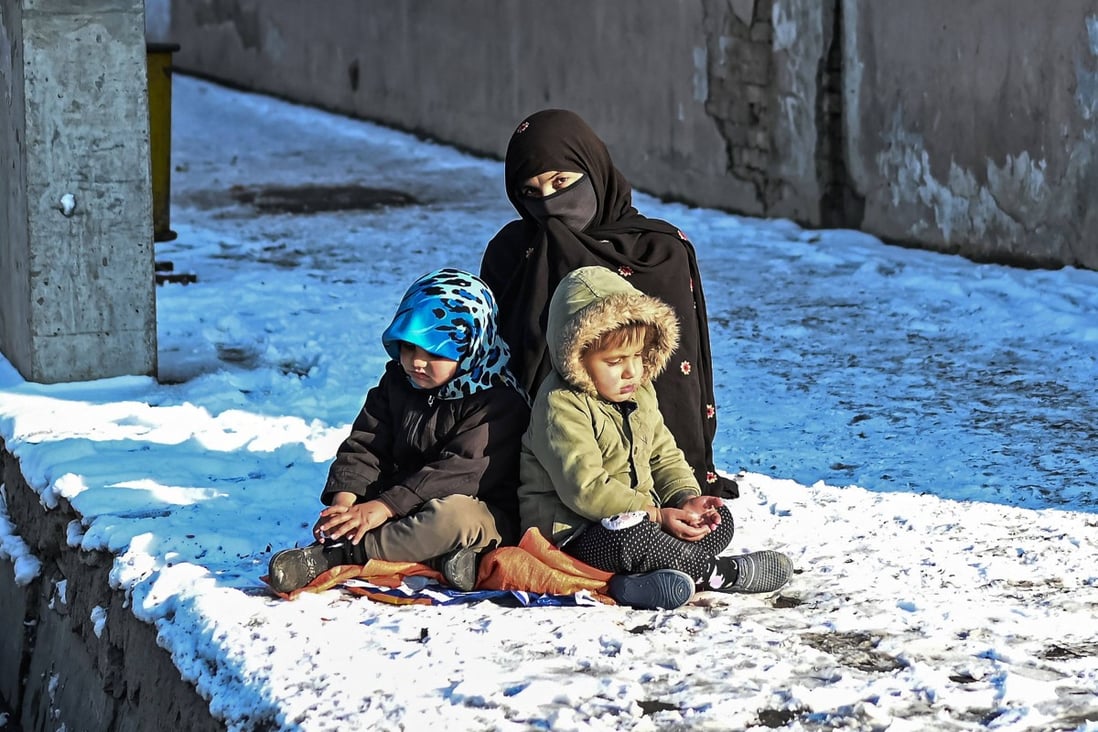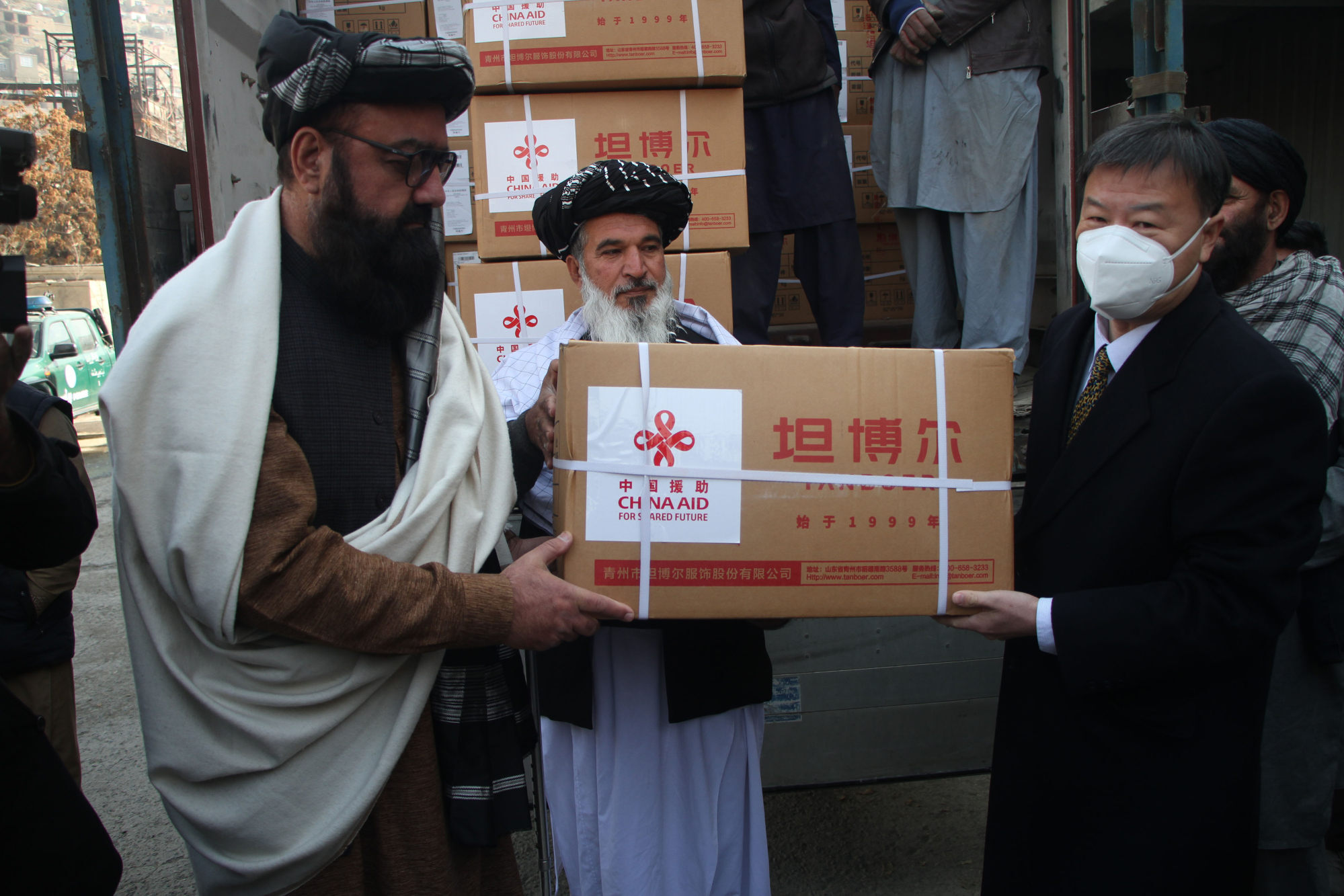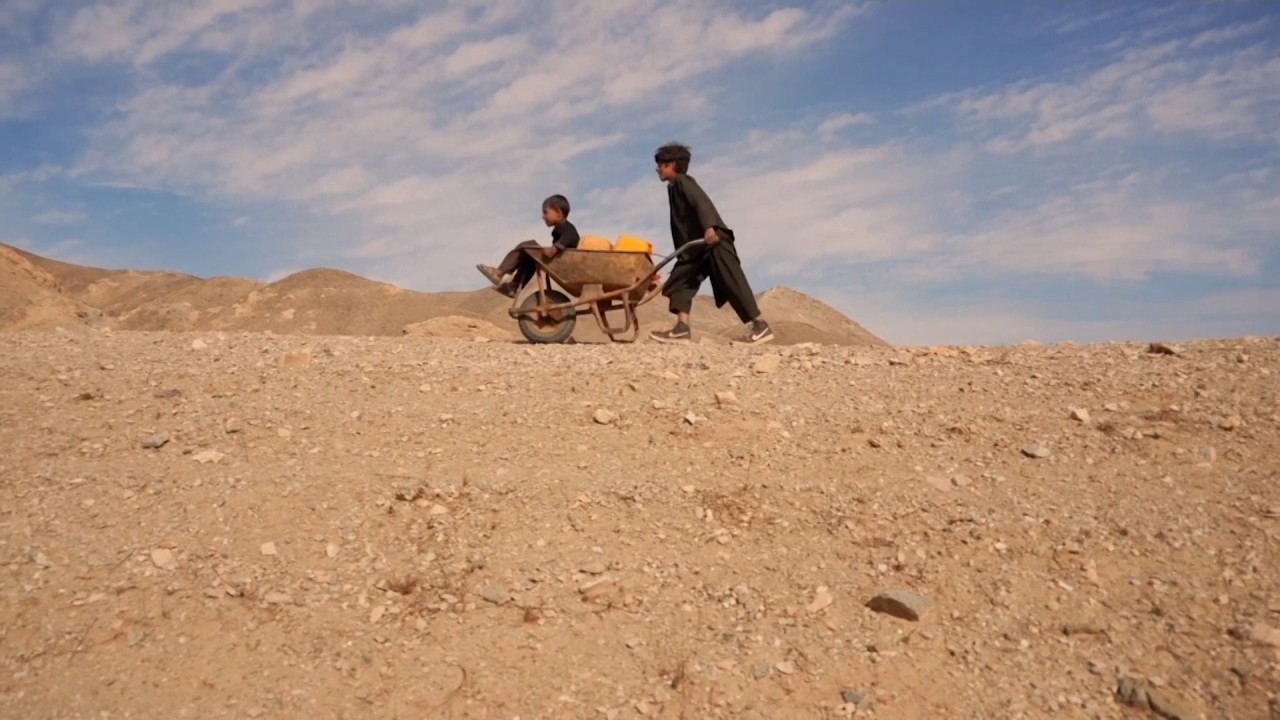China sends aid to Afghanistan as Taliban grapples with winter crisis
Beijing is stepping up efforts to engage with the country’s new government as millions face the risk of starvation
China is sending winter clothing and agreed to build a mosque and two wells


Afghanistan is facing a humanitarian crisis this winter. Photo: AFP
China is sending winter supplies to Afghanistan, which is facing an acute financial and humanitarian crisis.
Diplomatic observers said the aid and infrastructure would help build ties with the Taliban.
The Taliban, which seized power in August following the withdrawal of American troops, is facing a series of challenges in reconstructing the country.
The winter has intensified the crisis it is facing. Reports have estimated that nearly 23 million people lack adequate food supplies, and the US has frozen around US$9 billion in Afghan assets.
Zhu Yongbiao, director of the Centre for Afghanistan Studies at Lanzhou University, said Afghanistan faces a “systemic crisis” and the humanitarian situation will be “very serious”.
Zhu said this could “seriously challenge” this Taliban’s rule due to its lack of experience.
This week, China sent a second batch of winter supplies that will assist about 50,000 Afghan families, including 70,000 blankets and more than 40,000 down coats.
Chinese and Afghan officials also announced a project to build a mosque and two wells in Kabul.
China is sending winter supplies to Afghanistan, which is facing an acute financial and humanitarian crisis.
Diplomatic observers said the aid and infrastructure would help build ties with the Taliban.
The Taliban, which seized power in August following the withdrawal of American troops, is facing a series of challenges in reconstructing the country.
The winter has intensified the crisis it is facing. Reports have estimated that nearly 23 million people lack adequate food supplies, and the US has frozen around US$9 billion in Afghan assets.
Zhu Yongbiao, director of the Centre for Afghanistan Studies at Lanzhou University, said Afghanistan faces a “systemic crisis” and the humanitarian situation will be “very serious”.
Zhu said this could “seriously challenge” this Taliban’s rule due to its lack of experience.
This week, China sent a second batch of winter supplies that will assist about 50,000 Afghan families, including 70,000 blankets and more than 40,000 down coats.
Chinese and Afghan officials also announced a project to build a mosque and two wells in Kabul.
Taliban gets 800,000 Covid-19 vaccine doses as part of China’s aid to Afghanistan
In the ceremony to inaugurate the projects on Sunday, the Chinese ambassador Wang Yu said China would also help Afghanistan in international affairs.
“[We are] speaking out on the international stage for developing countries like Afghanistan and countries that have suffered unfair treatment,” Wang said, according to a statement by the embassy.
Ma Xiaolin, a senior professor at Zhejiang International Studies University, said Chinese material aid is important, but it will not fully alleviate the humanitarian crisis in Afghanistan.
Ma said the country’s geography meant it suffered cold winters and “imports of fuel and medical resources are blocked” while its mining industry is suffering as a result of decades of conflict.
In the ceremony to inaugurate the projects on Sunday, the Chinese ambassador Wang Yu said China would also help Afghanistan in international affairs.
“[We are] speaking out on the international stage for developing countries like Afghanistan and countries that have suffered unfair treatment,” Wang said, according to a statement by the embassy.
Ma Xiaolin, a senior professor at Zhejiang International Studies University, said Chinese material aid is important, but it will not fully alleviate the humanitarian crisis in Afghanistan.
Ma said the country’s geography meant it suffered cold winters and “imports of fuel and medical resources are blocked” while its mining industry is suffering as a result of decades of conflict.

Chinese ambassador to Afghanistan Wang Yu hands over winter supplies to members of the Taliban government. Photo Xinhua
He added: “The stability of the Taliban’s regime would be greatly affected, and there is a risk that the local population would defect to terrorist and extreme groups and organise disobedience movements; at the same time, there is a risk that ethnic problems within Afghanistan could be stirred up.”
Beijing has not officially recognised the Taliban government and has said it will not be the first to do so, but it is stepping up its engagement with the group.
In September, Beijing announced it would donate 200 million yuan (US$31 million) in aid, including food and coronavirus vaccines. In November China also agreed a deal to import pine nuts, one of the country’s most important crops.

Afghanistan faces second year of drought, its worst in decades
Representatives from five Chinese firms have also been allowed to inspect mining sites, but security concerns mean little progress has been made.
Zhu said China’s influence in Afghanistan is on the rise, but its influence is still limited.
“There are still risks to China’s interaction with the Taliban in Afghanistan,” Zhu said, citing the group’s internal divisions and different views towards China, as well as possible changes in US policy.
Zhu also said that there would be no “large-scale infrastructure assistance” from China to Afghanistan at the moment because of risks on the ground.
Ma said Western countries were trying to start engaging with the Taliban, but it was still up to the group to establish an “inclusive government that respects different ethnic groups and respects women.”
“Only by promoting the integration of the Taliban government into the international community can the root cause of Afghanistan’s humanitarian problems be addressed.” Ma said.
He added: “The stability of the Taliban’s regime would be greatly affected, and there is a risk that the local population would defect to terrorist and extreme groups and organise disobedience movements; at the same time, there is a risk that ethnic problems within Afghanistan could be stirred up.”
Beijing has not officially recognised the Taliban government and has said it will not be the first to do so, but it is stepping up its engagement with the group.
In September, Beijing announced it would donate 200 million yuan (US$31 million) in aid, including food and coronavirus vaccines. In November China also agreed a deal to import pine nuts, one of the country’s most important crops.

Afghanistan faces second year of drought, its worst in decades
Representatives from five Chinese firms have also been allowed to inspect mining sites, but security concerns mean little progress has been made.
Zhu said China’s influence in Afghanistan is on the rise, but its influence is still limited.
“There are still risks to China’s interaction with the Taliban in Afghanistan,” Zhu said, citing the group’s internal divisions and different views towards China, as well as possible changes in US policy.
Zhu also said that there would be no “large-scale infrastructure assistance” from China to Afghanistan at the moment because of risks on the ground.
Ma said Western countries were trying to start engaging with the Taliban, but it was still up to the group to establish an “inclusive government that respects different ethnic groups and respects women.”
“Only by promoting the integration of the Taliban government into the international community can the root cause of Afghanistan’s humanitarian problems be addressed.” Ma said.
Let Super Duper Rich China sort out Afghanistan and its rich resources.
ReplyDeleteThe Americans are out of there. You can hardly expect people you have been targetting with IEDs just 3 months ago to quickly turn around and help you with your freezing winter.
Or you should have put a bit of thought into the wisdom of your IED campaign.
The fact is, China's Covid-19 vaccines have been unloved and unwanted overseas by any country as soon as it manages to get its hands on sufficient mRNA vaccines, especially in the face of new variants.
ReplyDeleteEven China Xiao DiDi, Malaysia has been trying to exit from the Sinovac scheme as quickly as it can get its hands on Pfizer supplies, and still avoiding offending its China Boss.
Wakakakakaka…
ReplyDeleteAnother round of Yankee asslicking acts!
Let China sorts out Afghanistan and its rich resources - on humanitarian ground!
Who r those spurious & self-righteousness western powers while mouthing all the right & flowery words for humanitarian shows & yet do nothing, exactly nothing, in aiding Afghanistan, a country that they have helped running to the ground?
"China's Covid-19 vaccines have been unloved and unwanted overseas"??!!
Wow… wow… what a pact of lies fabricated by u!
Up to today China is the largest donor of covid-19 vaccines to the world, especially to the poor countries where only a token of soon expired mRNA vaccines were been 'donated' by yr beloved uncle Sam!
China is having the lowest infection & death rates within the covid-19 pandemic. & closed to 85% of the Chinese r having full doses of China-made vaccines.
Meanwhile, in yr yankeeland, the infection is climbing daily together with the death rate!. The US populace has zilch confidence in the efficacy of the mRNA vaccines, thus the high number of ANTI-VAXXERS.
The high reinfection cases of the fully vaccinated Americans with the new Omicron valiant have proven the overblown efficacy of the mRNA vaccines!
Old moneyed mfer, do keep to yr 3rd dose of Pfizer jab & hope u only suffer prolong headache & bodily strains.